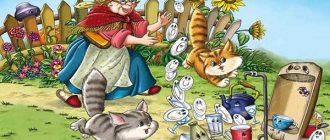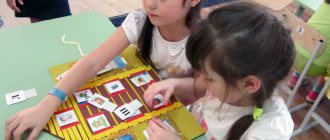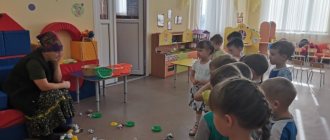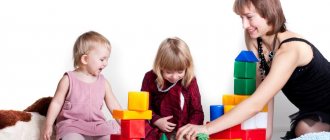Didactic games for children 6 - 8 years old based on fairy tales
Educational games for children 6 - 8 years old based on fairy tales.
Author:
Eremina Anastasia Nikolaevna, preschool teacher, teacher at GBDOU kindergarten No. 14, St. Petersburg.
Didactic games are designed for children of senior preschool and primary school age, educators, speech therapists, primary school teachers and parents. A fairy tale is a fictional story with a happy ending and the inevitable victory of good over evil. Most often, fairy tales contain magic and various adventures that are incredible in ordinary life. The inaccessible becomes accessible, the unreal becomes real. All children love fairy tales. It is the accessible language of a fairy tale that they understand more easily than the insipid speech of an adult. The role of fairy tales in raising children is multifaceted. They develop imagination and encourage fantasy. They also develop correct speech and learn to distinguish between good and evil. A fairy tale forms the basis of behavior and communication. Develops imagination and creativity. In preschool age, the leading activity is play; combining a game and a fairy tale, you get wonderful developmental exercises that will be useful to both preschool teachers and primary school teachers. This article presents games with fairy tales: -Russian folk “Sister Alyonushka and Brother Ivanushka”; -Russian folk “Masha and the Bear”; -Russian folk “Three Bears”; -Russian folk “The Wolf and the Seven Little Goats”; -Russian folk “Wolf and Fox”; -Russian folk “Morozko”; (from Afanasyev’s collection “Russian Folk Tales”) -Russian folk “At the Pike’s Command”; (from Afanasyev’s collection “Russian Folk Tales”) -Russian folk “The Frog Princess”; -Russian folk “Kolobok”; -Ukrainian folk “Rukavichka”; -Russian folk “Geese-Swans”; -Russian folk “Winter quarters of animals”; -Russian folk “Teremok”; -Russian folk “Havroshechka”; -Russian folk “Snow Maiden”; -Russian folk “Turnip”; -Russian folk “Sivka-Burka”; -Russian folk “Goldfish”; (from Afanasyev’s collection “Russian Folk Tales”) - A.S. Pushkin's Tale of the Dead Princess and the Seven Knights; -Charles Perrault “Cinderella”; -Charles Perrault “Puss in Boots”; -G.H. Andersen "Flint"; -G.H. Andersen "The Little Mermaid"; Objectives: — Clarify and enrich children’s knowledge about fairy tales;
— Teach children to recognize familiar fairy tales; — To make children want to help the heroes of fairy tales; — Develop intonation and speech expressiveness; — Develop speech, imagination, fantasy, thinking; — Develop the ability to act in a coordinated manner. GAME 1. “Whose words?”
Assignment : “Who says these words?”: “Don’t drink, Ivanushka, you’ll become a little goat” - Alyonushka.
“Don’t sit on the stump, don’t eat the pie” - Masha.
“Who sat on my chair and broke it?” - Little bear.
“Save us, we were eaten by a gray wolf” - Little Goats.
“Catch, catch, fish, big and small” - Wolf.
“Are you warm, girl, are you warm, red one” - Morozko. “At the behest of the pike, at my will...” - Emelya
“The beaten one is lucky for the unbeaten one” - Chanterelle
“Hut-hut, turn your front to me and your back to the forest...” - Ivan Tsarevich “I left my grandmother, I left my grandfather, and I’ll leave you, and even more so!” — Kolobok
“Sivka-burka, prophetic kaurka, stand in front of me like a leaf in front of the grass.” — Vanya (Ivan the Fool)
“What do you want, elder?” - Gold fish
“My light, mirror, tell me and report the whole truth.” - Queen “But remember, as soon as the clock strikes twelve..” - fairy - sorceress (Godmother)
GAME 2. “Confused letters.”
Assignment : I have a word, the letters of which have swapped places (in the top row), and in the bottom row under each letter there is a number that tells you what order the letters in this word are in. Place the letters in the appropriate order. If you do everything correctly, you will get a word. *Morozko
*Flint
*Cinderella
*Swan geese
*Kolobok
*Turnip
*Mitten
*Snow Maiden
*Mermaid
*Khavroshechka
GAME 3. “Guess the fairy tale.”
Assignment : We list the characters of the fairy tale - the children guess and name the fairy tale. Tsar, three sons, arrow, swamp (“The Frog Princess”).
Evil stepmother, stepdaughter, daughter, Santa Claus (“Morozko.”) Stove, ice hole, pike (“At the command of the pike”).
Alyonushka, Baba Yaga, little goat (“Sister Alyonushka and brother Ivanushka”). Shoe, ball, Fairy (Cinderella)
Boots, hat, cat (Puss in Boots) Goat, kids, wolf (Wolf and seven kids) Stove, apple tree, milk river, Baba Yaga (Geese-Swans) Bull, ram, pig, goose (Winter quarters of animals)
Grandfather, grandmother, granddaughter, Bug (Turnip) Mosquito-Squeaker, fly-fly, mouse-gnaw (Teremok)
Riddles about fairy-tale characters are perhaps one of the most popular among children, along with riddles about animals.
After all, riddles about fairy-tale heroes are interesting not only as entertainment; children like to solve them, especially after reading a fairy tale. They were waiting for mother with milk, And they let a wolf into the house... Who were these Little children?
Seven little goats
The beautiful maiden is sad: She doesn’t like spring, It’s hard for her in the sun!
The poor thing is shedding tears! Snow Maiden
While eating rolls, a guy rode on the stove.
I rode around the village and married the princess. Emelya
It was baked from flour and mixed with sour cream.
He was chilling at the window, He was rolling along the path. He was cheerful, he was brave, and on the way he sang a song. A bunny, a gray wolf and a brown bear wanted to eat him. And when the baby met a red fox in the forest, he couldn’t get away from her. What kind of fairy tale? Kolobok
I wish the evening would soon approach, And the long-awaited hour has come, So that I can go to a fairy-tale ball in a gilded carriage!
No one in the palace will know where I come from or what my name is, But as soon as midnight comes, I will return to my attic. Cinderella
With whom does Frost play hide and seek, in a white fur coat, in a white hat?
Everyone knows his daughter, And her name is... Snow Maiden
This fairy-tale hero With a ponytail, a mustache, He has a feather in his hat, He is all striped, He walks on two legs, In bright red boots.
Puss in Boots
We recommend watching:
Features of the development of preschool children Notes on educational activities in the senior group. Theatrical game Script of the fairy tale play “The Adventure of Pinocchio” for production at a preschool educational institution Synopsis of an integrated lesson on familiarization with fiction and fine arts (modeling) in high school
Similar articles:
Games to develop the attention of children 6-7 years old
“Tell a fairy tale from a picture” Goal: To develop the ability to retell a familiar fairy tale based on illustrations. Equipment: Plot pictures for fairy tales or a series of plot pictures. Progress of the game: The teacher shows the child a story picture. The child names the fairy tale and describes what is depicted in it. If desired, the child can tell the story in full. “Who is the extra character?” Goal: To clarify children’s knowledge of the content of fairy tales and fairy-tale characters. Equipment: figurines of fairy tale heroes from various types of theater. How to play: The heroes of one of the fairy tales with one extra character are placed on the table. For children 5 years old, it's called a fairy tale. Children must name who is extra, who is lost. Children after five years old must name which fairy tale the heroes are from and who is lost. Lotto “Find fairy-tale characters” Goal: To develop the ability to recognize a fairy tale and its characters. Equipment: Large cards with the plot of a fairy tale; small cards depicting fairy-tale heroes of a fairy tale Game progress: Children have large cards with the plot of a fairy tale. The presenter shows small cards. The child, who has a hero from a fairy tale depicted on a large card, names the hero and takes him for himself. The first one to fill out his card wins. “Who gets it together faster” Purpose: To consolidate the content of fairy tales. Equipment: Figures of fairy-tale characters, illustrations of fairy tale plots. How to play: The plots of different fairy tales are laid out on the tables. Children are given figurines or illustrations of fairy-tale characters. Children dance to the music with their characters. At the teacher’s command, children find the desired plot and pose their own fairy-tale hero. “Name a fairy tale” Purpose: To consolidate the content of fairy tales and fairy-tale characters. Equipment: A playing field on which the plots of different fairy tales are placed in turn; cube. Progress of the game: The child throws the dice. Makes a move in accordance with the dropped number of points. Names the fairy tale he fell into and its characters. If he succeeds, he continues the game in order of priority. If he fails, he returns to the start. "What changed?" Goal: To consolidate the ability to distinguish and name fairy tale characters. Equipment: figures (illustrations) from a tabletop theater, from one or more fairy tales (complication). How to play: In front of the children are figures of heroes from one fairy tale (or from several). The names of the heroes are clarified. Then the children close their eyes and the teacher removes one toy. Children open their eyes and have to say what has changed. “Guess the fairy tale” Purpose: To consolidate the names of fairy tales and fairy-tale characters. Equipment: Cards depicting an excerpt from a fairy tale or a fairy-tale character. Progress of the game: the cards are turned over, the children come up in turn, choose a card, name a fairy tale or a character. If the answer is correct, the card is taken away; if not, it is put back in its place. At the end of the game, the winning cards are counted.
Aren't you tired? Then let's play some more!




